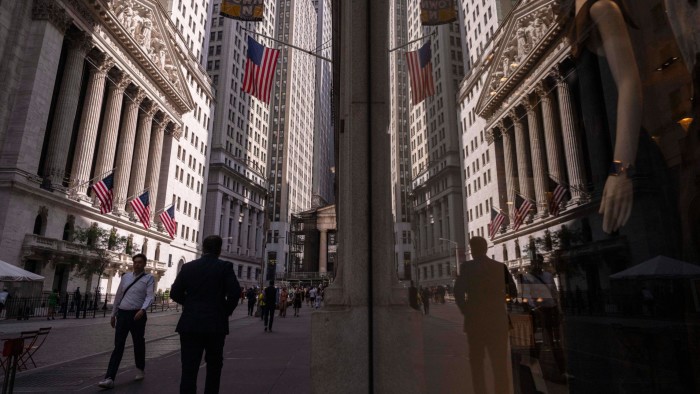Stay informed with free updates
Simply sign up to the US equities myFT Digest — delivered directly to your inbox.
Retail traders “buying the dip” in US stocks this year have racked up the biggest profits since the early stages of the Covid-19 crisis, helping to fuel a rally that has pushed Wall Street equities to record highs.
Individual investors have poured a record $155bn into US stocks and exchange traded funds during 2025, according to data provider VandaTrack, surpassing the meme-stock boom of 2021.
They continued to buy even as President Donald Trump’s blitz of tariffs on US trading partners sent stock markets tumbling in April — and their faith in the time-honoured strategy of piling in after stocks fall in anticipation of a rebound has paid off.
The Nasdaq 100 index of large-cap US technology stocks has risen 7.8 per cent this year. But an investor who bought the index only when it had fallen during the previous trading session would have locked in a cumulative return of 31 per cent over the same period, according to analysis by the Bank of America.
“Pops and drops will occur . . . but the dip-buying belief has become the new religion,” said Mike Zigmont, co-head of trading and research at Visdom Investment Group.
The habit of buying into stock weakness has become increasingly hard-wired into investors in the decade and a half of buoyant US markets that followed the 2008-09 global financial crisis, during which downturns have tended to be shortlived.
This year’s returns are the best for the BoA’s hypothetical dip-buying model at this stage of the year since early 2020, and the second best return in data going back to 1985.
Vanda’s senior vice-president of research Marco Iachini said “retail investors remain a major force in the market” and that their “dip-buying bias is fully intact”.
The rebound in US stocks — which hit fresh all-time highs last week even as the dollar and US Treasuries remain under pressure — has been “powered by a buy-the-dip dynamic that by some metrics has been even stronger than that seen in the latter stages of the 90s tech bubble,” said BofA equity analyst Vittoria Volta.
Professional investors have eyed the rally with caution due to lingering concerns over the impact of Trump’s landmark tax and spending bill on America’s national debt and the potential hit to US economic growth from his tariffs.
Deutsche Bank strategists said this week that there had been “few signs of strong bullish sentiment and risk appetite” among institutional investors since their demand peaked in the first few months of this year.
But dip-buyers are playing a risky game by opting not to cash out when prices surge, according to Rob Arnott, chair of asset management group Research Affiliates.
“We have a president who likes to surprise people, who likes to keep people off balance, to confuse his adversaries. All of this is a recipe for a higher volatility regime, and higher volatility means buying low and selling high is more profitable than in trending markets with stable policy,” Arnott said.
“Dip-buying works brilliantly until it doesn’t,” he added. “When you have a meltdown, it’s a quick path to deep regret.”


